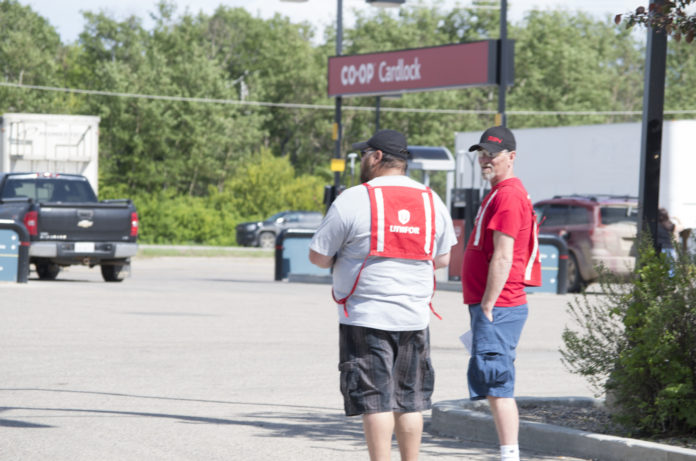
In 20 years of working at the Co-operative Refinery Complex (CRC) in Regina, Ryan Dzioba has never seen labour relations this bad.
Dzioba, a refinery process operator who grew up on a farm just 5 km south of Prince Albert, recognizes there’s some give and take in contract negotiations. However, the refinery lockout, which started in early December and sent roughly 800 employees to the picket line, has tested his patience.
“The mediator came back with a deal, a fair deal for both sides, and we accepted that,” Dzioba said, referencing a report delivered by special mediator Vince Ready back in March. “Ninety-eight per cent voted yes to that, yet Co-op used that as a starting point for negotiations, and then put 12 more concessions on the table. They’ve never wanted a deal from the start, and it continues to look like they don’t want a deal.”
Dzioba isn’t the only refinery worker frustrated with the negotiation process. On Wednesday, more than a dozen union members picketed the Co-op gas station on Marquis Road, along with the nearby Co-op bulk fuel station.
They’re discouraged by the last few months, and concerned that too many members of the public aren’t aware of what’s going on.
“Coming up north, a lot of people just don’t even know why we’re here,” said Rob Bourassa, a 16-year refinery employee. “Some people don’t even know about the refinery (lockout).”
“We’re just hoping we can get some people talking,” Dzioba added. “Unfortunately, only about 20 per cent of the people up here that I’ve talked to this week know that we’re still locked out, or even know that it’s going on at all. For some reason, the (news) doesn’t get far away from Regina.”
Discussions between Federated Co-operatives Ltd and Unifor Local 594 hit a brick wall on Dec. 5, when the two sides couldn’t agree on pension contribution plans. Union members were locked out later that day at 5:30 p.m. The move came after Unifor delivered a 48-hour job action notice, which was followed by a 48-hour lockout notice from the Co-op.
Since then, both sides have dug in, with the refinery bringing in replacement workers to keep production running, and seeking jail time for union members involved in blocking trucks from accessing the property. Unifor responded with rallies at the Saskatchewan Legislature, and controversial ‘Meet the Scab’ videos on social media. They also considered filing complaints against the Regina Police Service after they did not notify picketing members about a bomb threat delivered to Regina’s mayor. The suspect threatened to blow up Unifor blockades if they weren’t dismantled.
In February, Labour Relations and Workplace Safety Minster Don Morgan appointed special mediators Vince Ready and Amanda Rogers to assist in negotiations. At the time, both sides welcomed the decision, and Unifor members voted overwhelmingly in favour of Ready’s eight recommendations during a meeting on March 22.
However, the Co-op Refinery said it was unable to accept the recommendations due to changes in global economic circumstances caused by COVID-19.

“We have seen a drastic decline in the consumer consumption of fuel and rapidly declining oil prices that have put the CRC in a more difficult position than when negotiations began,” read a CRC statement issued on March 22. “Like all businesses, the refinery is now reassessing how to manage through the financial turmoil. As a company, we must consider how to reduce costs, delay capital projects, protect jobs and make decisions around cancelling projects that are no longer viable.”
Union members like Dzioba aren’t buying that explanation.
“It’s ludicrous,” he said. “They are actually making more money now because of this, because of the price of oil. To use that to put more (demands) on the table is just ludicrous.”
While union members are frustrated with the past six months of negotiations, most remain optimistic a deal will get done. Dzioba said the union isn’t going anywhere, so the CRC will have to negotiate whether they like it or not.
Others, like Bourassa, are less enthusiastic. He said the union gave up a lot of concessions when it signed its last contract, but the refinery keeps making more demands. He’d like to see voters contact their MLAs, since it was taxpayer money that paid for a special mediator, and he worries Unifor and the CRC won’t be able to mend their differences after a divisive six-month lockout.
“It was and still is a good place (to work), but I don’t know,” he explained. “That relationship might be broken between us for a little bit. I hope I can finish my career there.”
Union members rejected one last CRC proposal submitted in April. CRC management called the proposal their “best and final offer” in a statement issued on April 29, saying it provided fair wage increases, pension options and a choice of savings plan or performance bonus.
“The CRC will be required to make significant chances to support the transition to a low-carbon economy, and to protect our refinery and jobs long-term,” read a statement from Gil Le Dressay, CRC vice-president, refinery operations. “Recent developments in our industry have only accelerated those challenges we have been highlighting since the negotiations began with Unifor Local 594.
“It is our hope the union membership will soon understand that the only deal that balances their requirements and also achieves long-term certainty for the CRC is our best and final offer.”
Le Dressay also said the refinery plans to keep using replacement workers to keep the facility up and running. An unknown amount of oil spilled into Regina city sewers in May due to high winds, but managers are confident the current crew can operate the refinery for an indefinite period of time, if necessary.
“The team currently running the facility has met the Western Canadian fuel demand the entire winter and has filled all inventories to ensure market needs will be met,” Le Dressay said in a media release. “Notably, I can assure Co-op farm fuel customers that the fuel to support their operations for the 2020 season is available and ready to go. The talented women and men currently operating the refinery are among the best and most experienced in our industry, and they are running our equipment exceptionally well.”
Federated Co-operatives Limited (FCL) communications and public relations manager Cam Zimmer released an up-to-date statement to the Daily Herald on Thursday, reiterating those comments and concerns.
“The Co-op Refinery Complex has offered its best and final offer to the union,” the statement reads. “This offer provides a total compensation package that exceeds all other refineries in Canada, which they have chosen to reject in a tough economy and even tougher energy sector.
“We appreciate the efforts of the government appointed special mediators Vince Ready and Amanda Rogers to bring us closer together. FCL has made concessions throughout the bargaining process and has agreed to most of the special mediators’ recommendations.”
This isn’t the first time Unifor members have picketed 20 Co-op properties across Saskatchewan. Picketers were in Prince Albert two months ago, and have also held protests at rural Co-op properties such as the Shellbrook Co-op Gas Bar.
Editor’s Note: this story was updated with additional comments from Federated Co-operatives Limited (FCL) on Thursday, June 11.

